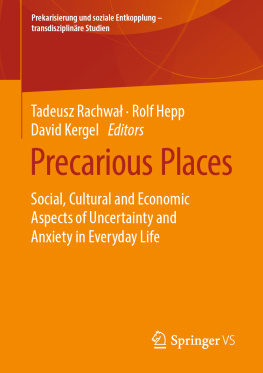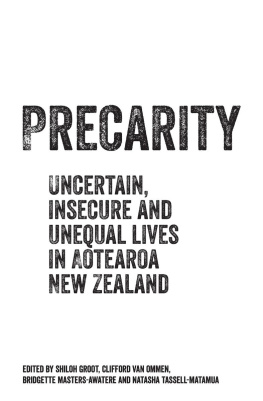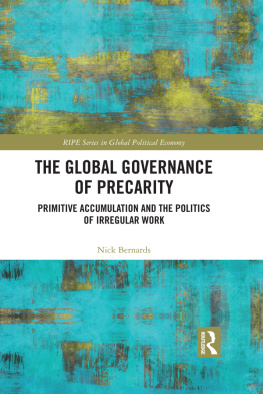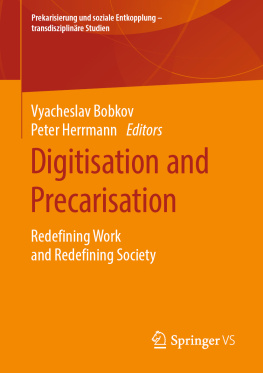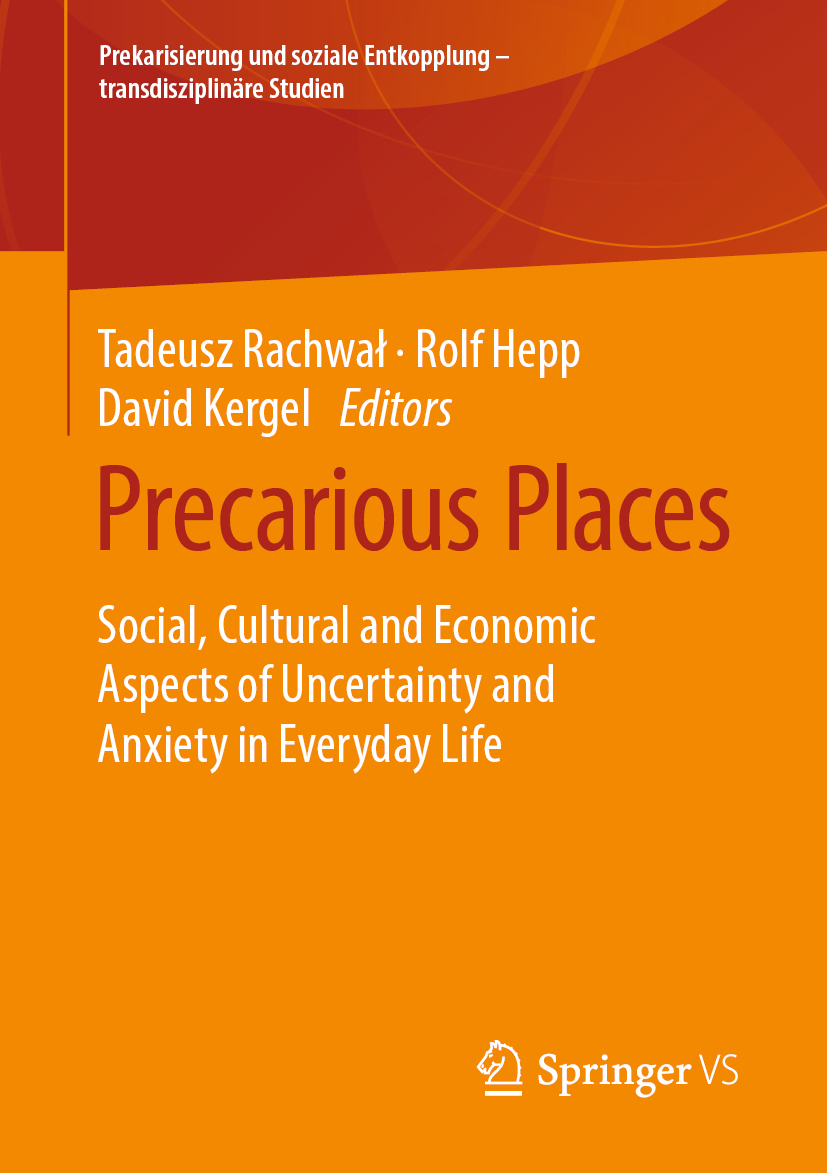Prekarisierung und soziale Entkopplung transdisziplinre Studien
Series Editors
Rolf Hepp
Institut fr Soziologie, FU Berlin, Berlin, Germany
Robert Riesinger
Journalismus und Public Relations (PR), FH Joanneum Gesellschaft mbH, Graz, Austria
David Kergel
HAWK Hildesheim, Hildesheim, Germany
Birte Heidkamp-Kergel
E-Learning Zentrum, Hochschule Rhein-Waal, Kamp-Lintfort, Germany
Die Zunahme sozialer Unsicherheit und kultureller Verunsicherung in postfordistischen Gesellschaften erzeugt einen Status Quo, in dem Prozesse der Prekarisierung und der sozialen Entkopplung (Robert Castel) verstrkt das Zentrum der Gesellschaft durchziehen. Der Verlust sozialer Garantien fhrt dabei zur Aushhlung sozialstaatlicher Errungenschaften. Dadurch werden die Lebenskontexte und das Alltagsleben der Menschen stark verndert.
Das sozialwissenschaftliche Netzwerk S.U.P.I. beschftigt sich auf europischer Ebene seit Jahren mit den gegenwrtigen Formen von sozialer Unsicherheit, Prekaritt und Ungleichheit. Die Reihe, herausgegeben von Mitgliedern des Netzwerks, prsentiert transdisziplinre Forschungen zu den sozialen und kulturellen Transformationen in den sozialstaatlich geprgten Demokratien. Sie versteht sich als Forum fr die Diskussion in nationalen, europischen und auch globalen Kontexten. Ebenen einer kritischen Analyse aus multidisziplinren und feldorientierten Perspektiven werden dabei initiiert, aufgenommen und untersttzt. berschreitung und ffnung dienen programmatisch als Wegmarken fr theoretisch-analytische Beitrge und empirisch-angewandte Forschung.
The increase of social insecurity in post-Fordist societies effect fundamental societal changes. As a consequence Precarity and Disaffiliation (Robert Castel) affecting increasingly the center of society. The loss of social guarantees leads to an erosion of the welfare state. As a result, living situations and everyday life are deeply changed.
The S.U.P.I.-Project (Social Uncertainty, Precarity, Inequality) is an European Research Group established by European and international scholars and experts. The network has been concerned with present forms of social insecurity, precariousness and inequality at European level for years. Edited by members of the network, the book series presents transdisciplinary research on aspects of social and cultural transformations in the democracies which are characterized by the welfare state. The book series opens a discursive space for discussions in national, European and global contexts. The contributions of the book series provide critical analyses from multidisciplinaryperspectives, theoretical-analytical reflections and empirical-applied research.
More information about this series at http://www.springer.com/series/15037
Editors
Tadeusz Rachwa , Rolf Hepp and David Kergel
Precarious Places
Social, Cultural and Economic Aspects of Uncertainty and Anxiety in Everyday Life
Editors
Tadeusz Rachwa
University of Social Sciences & Humanities Chodakowska, Warszawa, Poland
Rolf Hepp
Institut fr Soziologie, FU Berlin, Berlin, Germany
David Kergel
Carl von Ossietzky Universitt, Oldenburg, Germany
ISSN 2509-3266 e-ISSN 2509-3274
Prekarisierung und soziale Entkopplung transdisziplinre Studien
ISBN 978-3-658-27310-1 e-ISBN 978-3-658-27311-8
https://doi.org/10.1007/978-3-658-27311-8
Springer Fachmedien Wiesbaden GmbH, part of Springer Nature 2020
This work is subject to copyright. All rights are reserved by the Publisher, whether the whole or part of the material is concerned, specifically the rights of translation, reprinting, reuse of illustrations, recitation, broadcasting, reproduction on microfilms or in any other physical way, and transmission or information storage and retrieval, electronic adaptation, computer software, or by similar or dissimilar methodology now known or hereafter developed.
The use of general descriptive names, registered names, trademarks, service marks, etc. in this publication does not imply, even in the absence of a specific statement, that such names are exempt from the relevant protective laws and regulations and therefore free for general use.
The publisher, the authors and the editors are safe to assume that the advice and information in this book are believed to be true and accurate at the date of publication. Neither the publisher nor the authors or the editors give a warranty, expressed or implied, with respect to the material contained herein or for any errors or omissions that may have been made. The publisher remains neutral with regard to jurisdictional claims in published maps and institutional affiliations.
This Springer VS imprint is published by the registered company Springer Fachmedien Wiesbaden GmbH part of Springer Nature.
The registered company address is: Abraham-Lincoln-Str. 46, 65189 Wiesbaden, Germany
Introduction
The book offers a cross-disciplinary perspective on the various aspects of precariousness in contemporary culture and society, concentrating on the topographical aspects of sources and causes of uncertainty and anxiety. Precariousness and precarity are themselves provisional and uncertain categories, though ones inviting to rethinking the scopes of precarity and precariousness from the perspective of locality and of places involved in their otherwise global range. The recent years have shown some ways in which precarity has changed its status and has become a strongly debated area not only in economic and political disputes, but also in philosophical debates and various fields of research related to cultural studies. The articles included in the volume address the spatial scope of anxieties and uncertainties involving numerous men and women affected by the several decades of the neoliberal insistence on various kinds of flexibility which, in turn, has put in motion numerous new mechanisms of exclusion and marginalization. Apart from this, a historical view on the making of precarious places is also offered in the pages of the book.
In his contributionA Banality of Evil: Precarity as the Offspring of Individualism,Ronald Arnett unfolds the thesis that precarity is a form of social inevitability in the West due to its love affair with individualism, which functions as a social myth. Precarity, understood as an outgrowth of individualism. Individualism represents social ties and constraints, contrasted with selfishness that necessitates taking into account the social and commercial aspirations of others. Arnetts essay contends that precarity is a natural outcome of individualism; addressing precarity requires acknowledgement of social assumptions and structures that go unexamined, giving rise to a banality of evil within the realm of corporate responsibility.
Antnio Duarte presents a literature review which aims to characterize artists precarity in the context of their social integration, along with that precaritys consequences, the artists reactions it provoques and possible ways to counteract it. For his review, Duarte uses an interdisciplinary approach: the review is based on specialized research literature from psychology, sociology and economy of art. One result of the literature review is that precarity is experienced in multiple ways and entails risky material and psychological consequences and also affects the artistic creative process.

